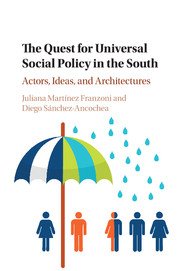Book contents
- Frontmatter
- Contents
- List of Figures
- List of Tables
- Acknowledgements
- List of Abbreviations
- Part I Universalism in the South
- Part II A Comparative Study of Policy Architectures
- Part III Building Universalism in Costa Rica
- Part IV Conclusions
- 8 Actors and Ideas in Comparative Perspective
- 9 The Quest for Universalism: Implications for Contemporary Policymaking
- References
- Index
8 - Actors and Ideas in Comparative Perspective
from Part IV - Conclusions
Published online by Cambridge University Press: 10 November 2016
- Frontmatter
- Contents
- List of Figures
- List of Tables
- Acknowledgements
- List of Abbreviations
- Part I Universalism in the South
- Part II A Comparative Study of Policy Architectures
- Part III Building Universalism in Costa Rica
- Part IV Conclusions
- 8 Actors and Ideas in Comparative Perspective
- 9 The Quest for Universalism: Implications for Contemporary Policymaking
- References
- Index
Summary
Introduction
In the previous three chapters, we explained how Costa Rica built a unified, pro-universal policy architecture and why it has recently confronted growing tensions. Our analysis confirmed that democracy and progressive political leadership were important factors behind this result. Electoral competition kept social policy at the forefront of the policy agenda and progressive changes accelerated – particularly after 1970 – during periods of left-of-center governments. Yet the existence of a dominant progressive party and political leaders like José Figueres – often taken as ultimate drivers of Costa Rica's exceptionalism (Huber and Stephens, 2012; Sandbrook et al., 2007) – can hardly account for the unification of the policy architecture. As we showed in Chapters 5 and 6, pressures from social movements also have limited explanatory power: in the 1940s collective actors were primarily demanding labor rights rather than social services, and in the 1970s they focused almost exclusively on access to land and better wages.
Instead, our analysis highlighted the combined role of state actors and international ideas in (re)shaping this architecture. At times bureaucrats and at other times political appointees, they all had in common direct access to political power, links to international policy ideas, and capacity to make bureaucratic change happen. In the 1940s, a small group close to President Rafael Ángel Calderón Guardia created social insurance for salaried workers by adapting ideas promoted by the ILO. In the 1970s, the social assistance funds, FODESAF became an innovative instrument of “targeting through universalism” thanks to the intervention of an expert team. Supported by President Daniel Oduber, these experts were in tune with international ideas that advocated the allocation of social services to the poor rather than transfers alone. During the 1990s, the existence of a state actor with political backing and a coherent agenda grounded on expert knowledge explains the expansion of primary health care nationwide, while its absence partly determined the failure of a managerial reform largely concentrated on hospitals.
Does this explanatory model stand when looking at cases other than Costa Rica? In this chapter, we explore this question by revisiting policy formation in Mauritius, South Korea, and Uruguay. Rather than seeking to account for all relevant changes in the three countries over many decades, ours is a robustness check.
- Type
- Chapter
- Information
- The Quest for Universal Social Policy in the SouthActors, Ideas and Architectures, pp. 185 - 201Publisher: Cambridge University PressPrint publication year: 2016



